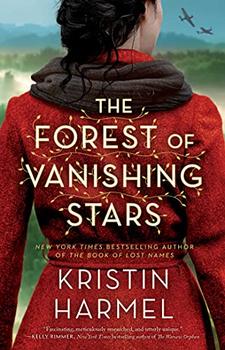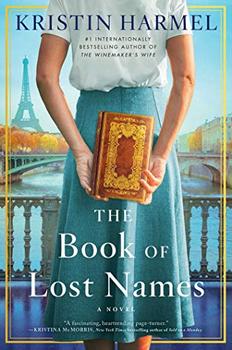Summary | Excerpt | Reading Guide | Reviews | Beyond the book | Read-Alikes | Genres & Themes | Author Bio

Liv Kent's world is falling apart. After 12 years of marriage, her husband has decided he's done, and Liv feels like she's lost everything—her job, her marriage, and her chance for children of her own. But she doesn't even have time to get back on her feet before Edith, her 99-year-old French grandmother, arrives, determined to snap Liv out of her funk by whisking her away to France. Or so Liv thinks; as Edith and Liv travel to Reims, a city in the heart of France's wine region, it becomes clear that Edith has a secret, one that threatens to upend everything Liv knows about her family. Thus begins a tale of three women, two trapped in a web of lies and betrayal in Nazi-occupied France, and the other a heartbroken divorcee who must uncover the truth about her grandmother's past before it's too late.
The Winemaker's Wife is told from three different points-of-view—those of Liv, Inés and Céline. These three women are vastly different, and the varying ways in which they define themselves - or in Céline's case, the way she is defined by the Germans - have a significant impact on the choices they make. Inés is the wife of the owner of the Maison Chauveau, but her marriage is falling apart. Her husband, Michel, doesn't trust her, she feels isolated out in the countryside and she'll give the Germans as much wine as they want if it means surviving the war. She would love to befriend Céline, the wife of the Maison's cellar master, but the other woman seems to shun all of Inés' efforts, making her feel even more out of place and unwanted. From Céline's point-of-view, Inés is flighty and clumsy, always making a mess of the work they do to produce wine. Céline is dedicated to the Maison Chauveau and to Michel, and she's determined to do whatever it takes to ensure the vineyard survives the war, including keeping as much wine as possible from the Germans. However, as Nazi power and influence in the region continues to grow, Céline's Jewish heritage puts her in danger, and her priorities begin to shift as she faces the threat of deportation or worse.
Despite being in the same place, the two women are worlds apart, and as the war continues, their differences become even more distinct as they each begin to make choices that they would never have made in peacetime. Inés chooses to escape the countryside and seeks out companionship, putting her in a complicated relationship with a Nazi sympathizer, while Céline grows closer to Michel, the one person who seems to care about the plight of the Jews and who would do anything to resist the Germans. Both women make bad decisions that lead to terrible consequences, and it's interesting to consider whether these choices would've produced such dramatic outcomes if they hadn't been made during the war. Nonetheless, the paths that Inés and Céline have chosen finally intersect on one tragic night when the fragile worlds they've built are shattered and their lives irrevocably changed.
In the present day, Liv is slowly learning about her grandmother's past, a past that she's never spoken about. As Liv and Edith spend more time in Reims and eventually visit the Maison Chauveau, it becomes clear that Edith's story is inextricably intertwined with those of Inés and Céline, and others who resisted the Nazis more than 70 years before. It also becomes obvious that Edith is seeking redemption for her role in the story, hoping to share the truth of what happened before her time runs out. Most readers will easily put together the pieces of the plot, past and present, by the end, but there is one final twist that may come as a surprise.
The novel has a fairly predictable story, but it shares the lesser-known tale of the French winemakers and their role in fighting back against the Nazis. Although these specific events are fictional, Harmel is able to bring life to the landscape and the people of the Champagne region of France through her intricate descriptions of winemaking and her vivid depictions of the vineyards and the wine cellars. The stories of Inés and Céline convey the fear, the horror and the bleak realities of surviving during war, and serve as a dark reminder of how one choice can have a wide and terrible impact. Liv's story, on the other hand, demonstrates that it's never too late to seek forgiveness and to shed light on the truth. The Winemaker's Wife is another entry into the large swath of WWII fiction, but its opulent setting and its unique history help it stand out as a must-read.
![]() This review was originally published in The BookBrowse Review in September 2019, and has been updated for the
March 2020 edition.
Click here to go to this issue.
This review was originally published in The BookBrowse Review in September 2019, and has been updated for the
March 2020 edition.
Click here to go to this issue.

If you liked The Winemaker's Wife, try these:

by Kristin Harmel
Published 2022
The New York Times bestselling author of the "heart-stopping tale of survival and heroism" (People) The Book of Lost Names returns with an evocative coming-of-age World War II story about a young woman who uses her knowledge of the wilderness to help Jewish refugees escape the Nazis—until a secret from her past threatens everything.

by Kristin Harmel
Published 2021
Inspired by an astonishing true story from World War II, a young woman with a talent for forgery helps hundreds of Jewish children flee the Nazis in this unforgettable historical novel from the New York Times bestselling author of the "epic and heart-wrenching World War II tale" (Alyson Noel, #1 New York Times bestselling author) The Winemaker's ...
Your guide toexceptional books
BookBrowse seeks out and recommends the best in contemporary fiction and nonfiction—books that not only engage and entertain but also deepen our understanding of ourselves and the world around us.